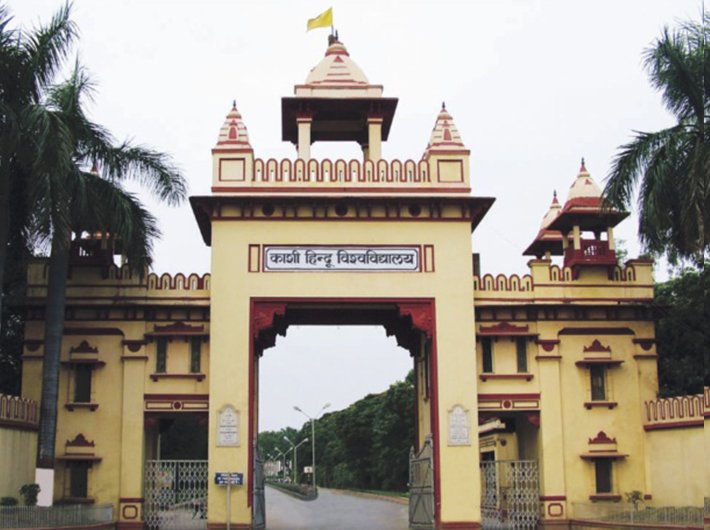From 1969, following an amendment in the Banaras Hindu University (BHU) Act, the university’s executive council is entirely nominated by the president of India on the recommendations of the HRD ministry. None of the executive council members are elected, which dilutes the democratic structure of the university. Also, the university today doesn’t have a teachers’ association and a students union.
The BHU VC and executive council members are usually from the same camp. The incumbent VC, Prof GC Tripathi, is considered to be close to the RSS. His predecessor, Dr Lalji Singh was believed to be a favourite of the UPA government. This has been a trend in BHU. That is the reason why a change in the regime at the centre influences the environment on BHU’s campus.
“The executive council of the university is not democratic for past 50 years. Almost all universities have 23-25 members in their executive council. Some are nominated and some are elected. However, in BHU, there are only nine members in the executive council and all of them are nominated by the president on the recommendations of HRD ministry. Currently all nine members are believed to have the backing of the same coterie. So where is the accountability of the vice chancellor? This needs to be rectified. The VC has to be accountable in front of a democratic council,” says professor Vishwanath Pandey.
Revisiting history of students’ union in the university would be interesting:
History of students' union at BHU
- In 1958, university witnessed a students' strike. This resulted in banning the students' union for a period of eight years; from 1958 to 1966.
- In the early 1990s, when Prof RP Rastogi was the VC, a students' strike took place which resulted in banning of the students' union.
- Following the death of two students in 1997 in police firing, the students' union was banned for an indefinite period. Violence had erupted in the campus.
- In 2011, the university administration introduced students' council in place of union. Faculty of arts student Vikas Singh became the first general secretary of the council. He was soon removed from the position for allegedly giving false information in his affidavit before the elections.
- Unlike a students' union where the president is directly elected, in the Students' Council, every class elects its representative and the elected representatives in turn elect the general secretary.
Lalji Singh, a Padma Shri awardee scientist, is referred to as the father of DNA fingerprinting in India. When his term ended in November 2014, Prof Tripathi was appointed the vice chancellor. However, unlike his predecessor and previous VCs, Tripathi is not a towering figure in academics. Formerly with Allahabad University, he is considered an RSS man. He was chosen by a search-cum-selection committee headed by justice (retd) Giridhar Malviya. The HRD ministry also appointed Prof Tripathi as the chairman of the IIT-BHU, ignoring the short list the institute had provided.
READ: Something rotten at the heart of BHU
Though this is not the first time that the VC of this university is a man handpicked by the government, his style of dealing with problems has been repeatedly questioned.
Ever since Tripathi took charge, he has been accused of propagating the RSS agenda in the campus. Shortly after his appointment, Tripathi dismissed IIT's visiting professor Sandeep Pandey, a Magsaysay awardee social activist. The VC accused him of being a Naxalite and being involved in 'anti-national activities'. In an interview with The Hindu, the vice chancellor said that Pandey was trying to rake up Kashmir issue in the university premises. This disturbed the Left forces, including many teachers and students of the university.
Caste plays a major role in BHU's administration. It is either Thakur or Brahmin. During Tripathi's tenure, apart from the Left and anti-BJP people, even certain caste lobbies are upset. Before him, three VCs - Dr Lalji Singh, Prof DP Singh and Prof Panjab Singh - were of a particular caste. Tripathi is accused of showing biases even in filling administrative and academic vacancies. There are charges and appellate against of him of corruption in appointment.
The VC has often made comments which reveal his chauvinistic and feudal mindset. In a protest where female students alleged that they faced gender-based discrimination while choosing subjects in the undergraduate courses, Prof Tripathi said, "Achhi beti wahi hoti hai jisko apni aur apne bhai ki padhai mein se koi ek chunna ho toh wo bhai ki padhai chunne [A good daughter is the one who sacrifices her studies for her brother]", recalls a student who wished to be anonymous.
On the other hand, a section of media has added to the situation by reporting matters not exactly factual: for example, there were reports a year ago that there is no Wifi connectivity and no non-veg food for girls in the BHU campus. Close to 80 of the 90-plus hostels in BHU are connected with WiFi/LAN, and the rest are in the process of getting the connection. In fact, BHU is one of the few universities which provide excellent infrastructure to students at a nominal fee.
Also, ever since Prof Tripathi took charge as VC, political activities in the campus got a thumbs-up in the campus. His predecessor Dr Lalji Singh did not allow the then MP from Varanasi, Dr Murli Manohar Joshi, to talk to students, only to avoid any political activity in the campus.
What the university suffers from today is not a single issue: it is the result of a number of issues that have piled up and which the current VC has failed to resolve satisfactorily.
The anti-VC forces and lobbies were looking for an opportunity. What started last week as a protest by a few men and women for alleged sexual harassment turned into a political war against the university administration.
Students, who are being blamed for staging protests without filing a complaint with the administration, have alleged that the university was not acting on their complaint and this brought them on streets to protest.
“If the VC had met the protesting students and assured action against the accused, nothing of this sort would have happened,” says a professor from the Institute of Ayurveda Sciences.

